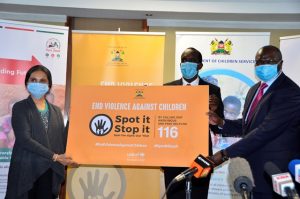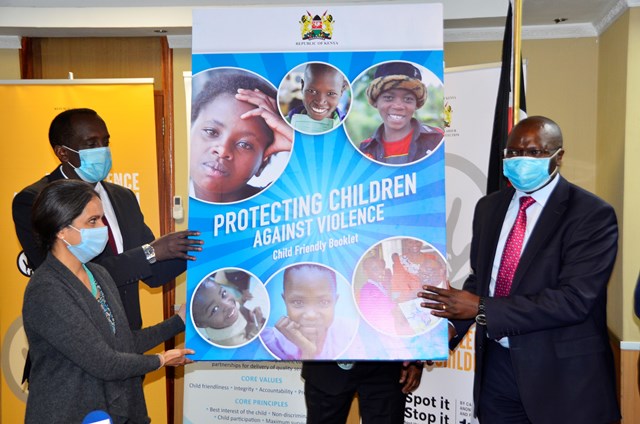At least half of young adults in Kenya experienced violence as a child, a new study by the Government has revealed.
The survey undertaken by the Ministry of Labor and Social protection in partnership with the Centers for Disease Control and Prevention (CDC) further says that 46 percent of 18 to 24-year-old young women faced at least one type of violence physical, emotional or sexual during their childhood as well as 52 percent of young men under the same age bracket.
Speaking during ‘The 2019 Violence Against Children Survey (VACS)’ and other child protection and advocacy documents, Labour and Social protection Cabinet Secretary Simon Chelugui said the survey report gives the government a strong planning tool for combating all forms of violence against children in the country.
He explained that when compared the two results of the last VAC survey done in 2010, it shows decline in prevalence of childhood violence and this gives the government encouragement that reducing violence against children is indeed possible.
“The country has been making progress in the right direction. However, the overall prevalence is still too high and it is important to note that some form of recent sexual violence experienced by girls aged 13 to 17 years has increased from 2010 to 2019, which is concerning”, Chelugui said .
The CS specifically named the violence children experience in homes which the survey found to be high where children are exposed to physical violence, emotional violence, physical assault by their parents, caregivers or other adult relatives.
“Children who witness or experience violence might learn that violence is appropriate for conflict resolution or is acceptable in intimate interpersonal settings. The 2019 Survey has indeed found a high association between witnessing violence at home and child’s victimization of violence”, he said .
Another critical finding, CS said is that children who experience physical, sexual and emotional violence suffer from mental health problems.
What is alarming he added is the high level of tolerance of violence such as corporal punishment, wife beating and negative gender norms among children and young people.
Believing violence is necessary or tolerated make our children vulnerable to both victimization and perpetration of violence. In this way, a cycle of violence perpetuates itself through families, schools and communities
“Now is the time to stop this cycle of violence to protect our children and their children and generations to come in this great nation”, the CS said.
Maniza Zaman, Representative, UNICEF Kenya said the national surveys on violence against children have been completed in 16 countries and Kenya is one of two countries globally which has done a repeat survey.
“All credit to the Government of Kenya in prioritizing such data which allows us to review trends and progress and this survey plays a critical role in all our work to end violence and abuse”, she said .
Zaman noted that the survey has some very disturbing findings and COVID 19 and containment measures are exacerbating the situation
“Families are under stress, facing uncertain futures and juggling many issues. Violence against children can become at outlet to frustrations and children are also more at risk from online predators”, she said .
She added that UNICEF is concerned that children who are not in school can be exposed to an increased risk of violence, including maltreatment, gender-based violence and sexual exploitation.
Zamani said there is need to build a social movement to end violence and everyone has to recognize what violence against children is, who might be responsible and how to prevent and report it so they can stop it happening or act if they see it.
US Ambassador to Kenya Kyle McCarter who participated in the meeting virtually said The Violence Against Children Survey is important and timely especially at this time when there are media reports on teenage girls becoming pregnant during lock down.
“The consequences of dropping out of school are grim and cyclical and adversely affect the survivor’s socio-economic well-being. Some of these pregnancies are a result of sexual violence which has unfortunately risen during this period”, he said
The Ambassador noted that to understand issues like violence against children, sound and comprehensive data is need to make the best possible decisions about policies and programs to improve lives especially of the most vulnerable who are children.

“The 2019 Violence Against Children Survey provides us the tool needed for data-driven decision making and as we celebrate the strides made in Kenya to mitigate violence against children and youth, we also recognize that violence is on the rise during the COVID-19 pandemic.
The results from this report, McCarter said will directly and positively impact the lives of children and youth. And thus it should prepare through its National Prevention and Response Plan to prioritize future investments and directions that will help everyone collectively to “Spot and Stop Violence Against Children”
To ensure that children get a snap shot of the VAC National Prevention and Response Plan, CS Chelugui said a Child Friendly Booklet on Protecting Children Against Violence had been developed in a simpler language they can understand.
The booklet will assist children be aware of the various kinds of violence, why children experience violence and where they can seek for help.
The government is also kick starting a public behaviour change campaign on Violence against Children, “Spot it, Stop it” to create awareness from the national to the grass root levels on violence meted against children, and how we can stop it.
Some of the findings in the report also notes that a third of children said they experienced emotional violence by peers, such as being bullied or made to feel scared, in the past 12 months, Nearly one in six women and one in fifteen men said they experienced sexual violence as a child and also tolerance of abuse is high, with around half of boys and girls telling researchers it is acceptable for a husband to beat his wife.
By Wangari Ndirangu




